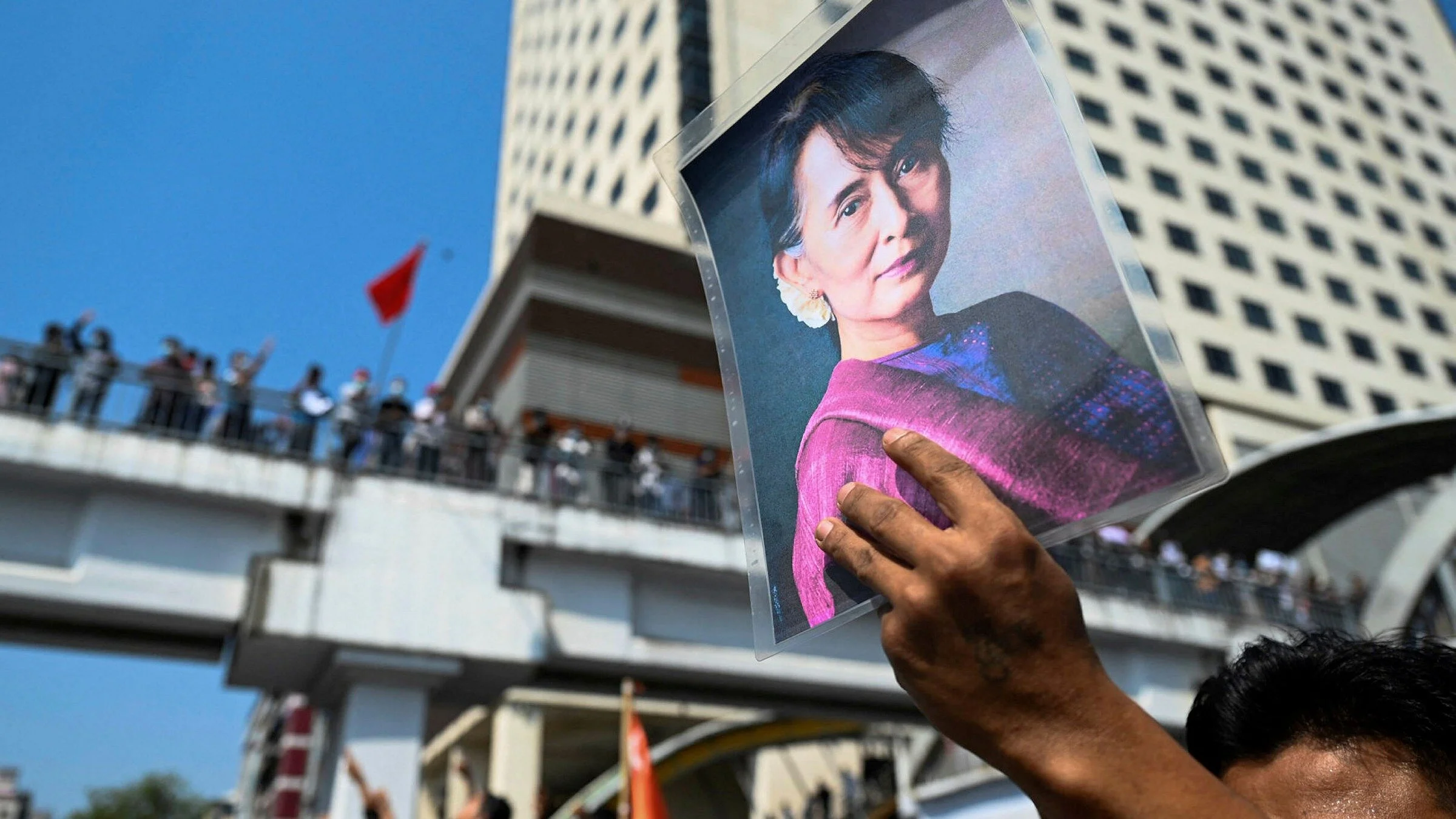For some years now, we have been praying for the people of Myanmar. Firstly, and perhaps most urgently, we have prayed for justice for the Rohingya – a persecuted muslim minority. Secondly, we have prayed for all the people of Myanmar, who live under an oppressive military regime. The name of Aung San Suu Kyi is well known as a person who lived under house arrest for fifteen years and won the Nobel Peace Prize, but most of us (including me) don’t have a close connection to Myanmar, and it can be hard to keep up.
In February this year, the military leadership of Myanmar under General Min Aung Hlaing staged a coup d’état and seized control of the government. Of course, this military dictatorship claims to be the legal and legitimate government of Myanmar.
In response, the National Unity Government was formed. It sounds impressive, doesn’t it - The National Unity Government? But the reality is that all of its members live in exile or in hiding. The NUG has been declared illegal by the military rulers and, of course, they have no money to speak of. A month ago, they announced the establishment of their own army, the People’s Defence Force, which they plan to use to launch an armed revolution against the military junta. The NUG includes Aang San Suu Kyi and a range of democratically elected officials from before the coup. They are an underground government, an alternative, parallel source of authority. God only knows how things will turn out for them.
In Mark chapter 3, just before the portion we heard today, Jesus takes a group of people up a mountain. He appoints twelve to be with him, to be sent out to proclaim the message of the Kingdom, and to cast out demons.
The number twelve is no accident. There are twelve tribes of Israel, each one drawing its identity from the sons of Jacob. Jesus is appointing an alternative government. The leaders of an underground movement, who will challenge the way things are. He has already announced that the Kingdom of God has come near, and that everyone should repent and believe in this ‘good news’. Now, he is putting in place his government in exile. Twelve apostles to lead the twelve tribes.
Now, you might be thinking ‘surely Jesus’ message was spiritual. He was talking about a divine kingdom and repentance of sin to get right with God. What’s politics got to do with it?’.
But the reality is that in the first century Western Levant, and indeed in most of the Ancient World, there was no distinction between the spiritual and the political. In the world of Jesus, there were two main sources of political authority, each with their own theological rationale. There was the Roman Empire, led by a living God. And there was the Jewish priestly elite, who had direct contact with God via the Temple.
Jesus establishes an alternative power structure, and invites people to join in. It’s not long in the story before the Scribes, part of the powerbase at the Temple, arrive to say that Jesus is under the control of the Demon Lieutenant, Beelzebul. As I’ve explained many times before, in the first century Jewish worldview, Satan was the Boss Baddie and had control of the world. This was widely acknowledged. So what better way to marginalise and disempower someone than by saying they are, quite literally, in league with the devil?
Jesus, in this conversation which reads a bit like a courtroom drama, challenges their logic. Jesus is not using Satan’s power to drive out Satan’s minions. Oh no! Jesus is like a home invader. He has snuck into Satan’s shack, he has tied Satan up, and now he is wreaking havoc, and stealing all Satan’s stuff.
Let’s pause for a moment and imagine that a member of your family told you that they were establishing an alternative government to stage a revolution against the existing government. Let’s imagine they were gathering people around them and training them up to spread the message. Then let’s imagine that, when challenged by intellectuals and experts, they explained that they were going to tie up the devil and seize control of the world. They explain that this is all about nonviolence and peacemaking, but still - you’re ever so slightly worried.
We don’t need to imagine how Jesus family reacted, because Mark explains it for us. People are saying ‘he has gone out of his mind’. The family show up to try to settle him down. Later, they will try to gain access, and Jesus will effectively tell them to shove off. It’s not what you would call a functional family dynamic.
Of course, the author of the gospel of Mark is spinning a gripping tale. Mark doesn’t muck around – getting straight to the point with big, dramatic words and actions from Jesus right at the outset. Mark’s Jesus doesn’t muck around getting born or visiting the temple, he gets baptised by John, thrust into the desert, then emerges to declare the new Kingdom.
Even if the reaction of Jesus’ family is a bit of narrative licence, when reading the scriptures from a nicely bound book in a nicely heated building in a modern democracy, it can be easy to miss Jesus’ dangerous and subversive behaviour. He’s fired up. He’s madly recruiting and training and strategising. He has firmly in his sights the Roman Empire, King Herod, The Temple Elites and the exploitative hegemony that undergirds them. He’s going to fight against them with stories and healing. Is it any surprise that his family thought he was nuts?
If you met someone who explained to you that Joe Biden and Xi Jinping and Mark Zuckerberg and Gina Rinehart were all really working together in league with the devil, you would probably politely excuse yourself. If they invited you to come and join their resistance movement, and let you know that you would need to leave behind everything you know and embrace the strong possibility of execution, you would probably have an urgent prior commitment that day.
This is our privilege.
Because in Myanmar - whether you are Karen or Chin Christian, or Rohingya muslim, or whether you’re one of the majority Buddhists who oppose the regime – I think our friend with the conspiracy theories and talk of demons would get a pretty fair hearing. It kind of makes sense. Powerful people look out for the needs of powerful people, and don’t give a stuff about the little guy. And they are consumed by evil, and this evil is running rampant in the world. It doesn’t sound so radical as you hide in the forest, trying to plot a revolution.
The revolution that Jesus proclaimed was not one of armed uprising. The National Unity Government in Myanmar, however justified, is not doing Christ’s work. So too, the armed Jewish uprisings in the sixties of the first century, in response to which the Romans destroyed the Temple in Jerusalem, were not the revolution of Jesus either.
The revolution of Jesus, which is still underway, is the revolution of naming the injustices and the misuses of power, telling stories about a better way, and committing our lives to Jesus’ way of nonviolence and peace. The revolution will not be won by force of arms, but has already been won on the cross. The question for us is how will we live as revolutionaries until the new Kingdom is established for everyone?


